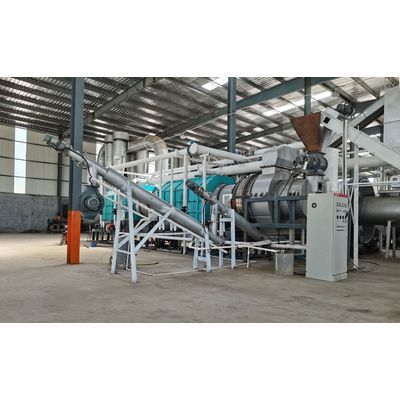

- Home
- Companies
- Beston Group Co., Ltd.
- Articles
- The Role of Wood Charcoal Making ...

The Role of Wood Charcoal Making Machines in Agricultural Production
Wood charcoal making machines, with their remarkable ability to transform wood into charcoal, hold a crucial place in the realm of agricultural production. Beyond the conventional understanding of charcoal's role in grilling and heating, these machines play a pivotal role in enhancing agricultural practices and sustainability. In this article, we explore the multifaceted role of wood charcoal making machines in modern agricultural production.
Enhancing Soil Fertility
Biochar as a Soil Amendment
At the heart of wood charcoal making machine impact on agriculture lies the production of biochar, a porous and stable form of charcoal. Biochar is a powerful soil conditioner that enhances soil fertility through a process known as carbon sequestration. During the pyrolysis process, when wood is converted into charcoal, carbon is captured and stored in the biochar. This carbon-rich material, when incorporated into soil, acts as a long-term carbon sink.
Furthermore, biochar's porous structure provides an ideal habitat for beneficial microorganisms. It improves nutrient retention, reducing the leaching of essential elements like nitrogen and phosphorus. This translates into more efficient nutrient use by crops, leading to increased agricultural productivity.
Sustainable Farming Practices
The integration of wood charcoal making machines into agriculture fosters sustainable practices. By using biochar as a soil amendment, farmers can reduce their dependence on chemical fertilizers. This not only saves costs but also mitigates the environmental impact of excessive chemical use. Sustainable farming practices, such as reduced tillage and organic farming, are encouraged, leading to healthier ecosystems and more resilient agricultural systems.
Energy Source for Agricultural Processes
Charcoal as a Clean Fuel
Wood charcoal produced by these machines serves as a clean and efficient energy source for various agricultural processes. Charcoal is derived through gasification and pyrolysis, resulting in a smokeless and clean-burning fuel. This clean combustion is not only environmentally friendly but also offers consistent heat, making it ideal for several applications in agriculture.
Applications in Agro-Processing
In the realm of agro-processing, wood charcoal is indispensable. It finds use in grain drying, ensuring that harvested crops are properly preserved. Additionally, charcoal serves as a reliable source of heat for greenhouses, creating optimal conditions for year-round cultivation. The stable and controlled heat output of charcoal enables precise temperature management, critical for the success of greenhouse agriculture.
Waste Utilization and Environmental Impact
Conversion of Agricultural Residues
Wood charcoal making machines contribute to efficient waste utilization in agriculture. Crop residues, often considered as waste, can be converted into valuable charcoal through these machines. This not only helps manage agricultural residues but also offers a "waste-to-wealth" approach, where what was once discarded becomes a valuable resource.
Reduced Deforestation Pressure
One of the significant environmental benefits of biomass pyrolysis plant is the reduced pressure on forests. By providing an alternative source of charcoal production, these machines help preserve fragile ecosystems and mitigate deforestation. This conservation effort contributes to the global fight against climate change by preserving carbon-rich forests.
Economic Implications and Accessibility
Income Generation for Rural Communities
Wood charcoal making machines have the potential to uplift rural communities by generating income opportunities. Small-scale charcoal production can become a source of livelihood for many, especially in areas with abundant wood resources. Job creation and income generation in rural settings contribute to economic development and poverty alleviation.
Challenges and Solutions
While the role of wood charcoal making machines in agriculture is undeniably beneficial, challenges exist, particularly concerning accessibility in rural areas. Technological accessibility, training, and sustainable practices need to be promoted to ensure the responsible use of these machines. Striking a balance between economic benefits and environmental stewardship is a challenge that requires careful consideration and collaboration.
In conclusion, wood charcoal making machines have transcended their traditional roles and emerged as indispensable tools in modern agricultural production. From enhancing soil fertility to providing clean energy and promoting sustainable practices, their impact is far-reaching. As agriculture continues to evolve, the synergy between wood charcoal making machines and sustainable farming practices will undoubtedly play a pivotal role in shaping the future of agriculture.
